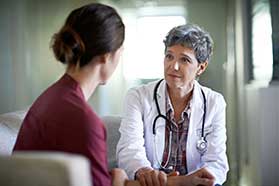Early Cancer Detection Test Hawthorne, NJ

Cancer occurs when abnormal cells invade and destroy healthy body tissue, and can begin almost anywhere in the body. If you detect cancer early, you greatly increase your chance for successful treatment if diagnosed.
Research into what triggers cancer cell growth is continually conducted. While a direct cause may not be proven, a number of factors can increase your risk of developing cancer. Tobacco use is commonly associated with presenting a higher risk of cancer, leading to about 22% of cancer-related deaths. About 10% of cancer-related deaths, however, are attributed to a number of reasons, including:
- Obesity
- Poor diet
- Lack of physical activity
- Alcohol consumption
- Genetics
- Over-exposure to sunlight and UV rays
- Carcinogen exposure
Detecting and preventing cancer involves two important steps: education and screening. Should you develop cancer, your chances of detecting it early can be greatly improved by regular physical exams or with routine tests - in turn improving your chances for a full recovery.
To help detect cancer early, before it worsens, schedule regular checkups, know your family history and be sure to regularly examine yourself and consult your healthcare provider if you discover any irregularities. To schedule a consultation with a qualified healthcare professional in Hawthorne that can perform an early cancer detection test, call (201) 806-6099 or contact Medwell Orthopedics & Functional Medicine for Men & Women online.
Early Cancer Signs
Being aware of the general warning signs and symptoms can help you detect possible cancerous cells in you or a loved one. However, cancer can develop without noticeable signs or symptoms, making regular screenings an important aspect for maintaining health. Cancer symptoms vary based on type; however, to be cautious, it is recommended to keep an eye out for the following early cancer signs:
- Unexplained weight loss
- Fever
- Fatigue
- Unexplained, prolonged pain
- Skin changes
Screening for Cancer
Cancer occurs in many forms. Detailed steps for detecting the different cancer types can be found below.
Breast cancer
Annual breast cancer screening is recommended for women beginning in their early 40s. To help detect breast cancer , women should:
- Get mammograms (x-rays of the breast) every year between the ages of 40 and 55. Women with a family history of breast cancer should start breast cancer screenings earlier in life.
- Switch to mammograms every 2 years, or continue yearly screening, when you are 55 and older.
- Continue screening as long as you are in good health.
- Know how your breasts normally look and feel, and report any breast changes to your healthcare provider right away.
Colon and rectal cancer
To help detect polyps, the primary indicator of rectal and colon cancer , both men and women, beginning at age 50, should follow one of these testing plans:
-
Colorectal screenings
that find polyps and cancer, which include:
- Flexible sigmoidoscopy every 5 years, or
- Colonoscopy every 10 years, or
- Double-contrast barium enema every 5 years, or
- CT colonography (virtual colonoscopy) every 5 years
- Routine testing annually including high-sensitivity fecal occult blood tests (FOBT)
Cervical cancer
To help detect cervical cancer , women should start testing at age 21. Additionally, they should:
-
Have a Pap test done every 3 years if between the ages of 21 and 29.
- HPV testing should not be used in this age group unless it's needed after an abnormal Pap test result.
-
Have both a Pap test and an HPV done every 5 years if between the ages of 30 and 65.
- This is the preferred approach, but it's acceptable to have a Pap test alone every 3 years.
Women should not be tested for cervical cancer if their uterus and cervix have been removed (a total hysterectomy) for reasons not related to cervical cancer and they have no history of cervical cancer or serious pre-cancer. Women over the age of 65 and that have had regular cervical cancer testing in the past 10 years with normal results should also not be tested. Women who have been vaccinated against HP should still follow the screening recommendations for their age group
Endometrial (uterine) cancer
The American Cancer Society recommends that, at the time of menopause, all women should be told about the risks and symptoms of endometrial cancer . Women should report any unexpected vaginal bleeding or spotting to their healthcare provider. Additionally, some women - because of their history - may need to consider having a yearly endometrial biopsy. Consult your healthcare provider about your history.
Lung cancer
Tests for lung cancer include medical x-rays of the chest that can visualize the lung and be used to detect irregularities. Additionally, your mucus can be examined under a microscope to see if it contains cancer cells. Lung cancer screening should be conducted if you are:
- 55 to 74 years of age
- In good health
- Have at least a 30 pack-year smoking history AND are either still smoking or have quit within the last 15 years. (A pack-year is the number of cigarette packs smoked each day multiplied by the number of years a person has smoked. Someone who smoked a pack of cigarettes per day for 30 years has a 30 pack-year smoking history, as does someone who smoked 2 packs a day for 15 years).
Prostate cancer
With the increasing prevalence of prostate cancer , the American Cancer Society recommends that men:
- Begin prostate exams at age 40.
- With a family history of prostate cancer should talk with a healthcare provider about their risk.
- Beginning at age 50 consider a prostate-specific antigen blood test, while African-American men, among whom prostate cancer is more common than Caucasian men, are advised to start these tests at age 40.
Cancer prevention relies on your awareness and diligence. To receive more information about early cancer detection or to schedule a consultation with a qualified healthcare professional in Hawthorne that can perform an early cancer detection test, call (201) 806-6099 or contact Medwell Orthopedics & Functional Medicine for Men & Women online.
Medwell Orthopedics & Functional Medicine for Men & Women
Address
33 Central AveMidland Park, NJ 07432
(201) 806-6099
www.BergenCountyDoctors.com
Hours
Mon:
8:00 am - 8:00 pm
Tue:
2:00 pm - 7:00 pm
Wed:
8:00 am - 6:30 pm
Thu:
8:00 am - 1:00 pm
Fri:
8:00 am - 6:30 pm
Sat:
9:00 am - 1:00 pm
Sun:
By Appointment Only

